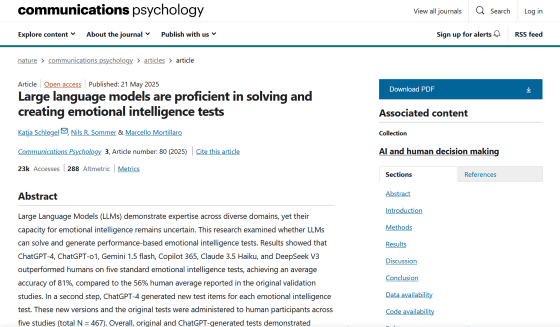AI may understand emotions better than humans, but experts say we shouldn't take it at face value

In May 2025, a Swiss research team published a paper in the academic journal Communications Psychology reporting that large-scale language models such as ChatGPT and Gemini outperformed humans in tests measuring
Large language models are proficient in solving and creating emotional intelligence tests | Communications Psychology
https://www.nature.com/articles/s44271-025-00258-x

New study claims AI 'understands' emotion better than us | Live Science
https://www.livescience.com/technology/artificial-intelligence/new-study-claims-ai-understands-emotion-better-than-us-especially-in-emotionally-charged-situations
A research team from the University of Geneva and the University of Bern in Switzerland tested ChatGPT-4, ChatGPT-o1, Gemini 1.5 Flash, Claude 3.5 Haiku, Copilot 365, and DeepSeek V3 using tests such as the Situational Test of Emotion Management (STEM) and GEMOK-Blends , which are widely used to measure EI.
When compared to answers verified by human experts, the large-scale language model selected the 'correct' response on average 81% of EI tests, beating humans' 56%. We also asked ChatGPT to create new EI tests, and the human raters found that the ChatGPT tests were of similar difficulty to the original tests and were not simply rephrases.
The research team concluded, 'These results contribute to the growing body of evidence showing that large-scale language models such as ChatGPT can perform at least as well as, and in some cases even better than, humans in socio-emotional tasks that have traditionally been considered possible only for humans.' 'These findings have important implications not only for the use of large-scale language models as social agents, but also for the use of them to assess socio-emotional skills.'

But when Live Science spoke to several experts, they said it's important to keep in mind the test methodology: the most commonly used EI tests are multiple choice, which means they can't be applied to every possible real-world scenario.
'It's important to note that humans don't always agree on other people's emotions, and even psychologists can interpret emotional signals differently,' says information security expert
Nauman Jaffer, founder of CliniScripts , an AI document management tool for mental health professionals, said, 'AI systems are good at pattern recognition, especially when emotional cues follow a recognizable structure like facial expressions or linguistic signals.' 'But equating that with a deep 'understanding' of human emotions risks overestimating the actual capabilities of AI.' He said that what the study revealed was not the EI that AI possesses, but its pattern recognition ability.

Most experts have found it difficult to claim that AI understands emotions better than humans, but Marcos Alves, CEO of Brazilian AI development company HAL-AI , claims that Aílton, a conversational AI for truck drivers developed by HAL-AI, is better at identifying emotions in real-time conversations with drivers than humans.
In one case, to a distraught driver after a colleague was killed in an accident, Aílton sent a swift, precise, and nuanced message of condolence, provided access to mental health resources, and automatically alerted the fleet manager.
Alves believes that the ability of large language models to absorb vast amounts of text and spoken conversation allows them to pick up subtle intonations that humans tend to miss. He argued that Aílton's data gives him a better ability to detect and respond to emotions than most humans, allowing him to bring empathy at a large scale.
in Software, Web Service, Science, Free Member, Posted by log1h_ik